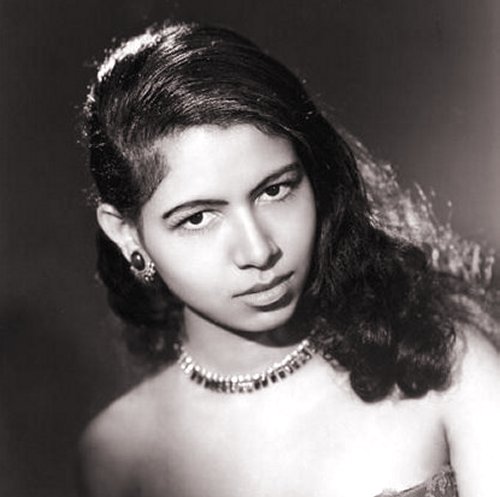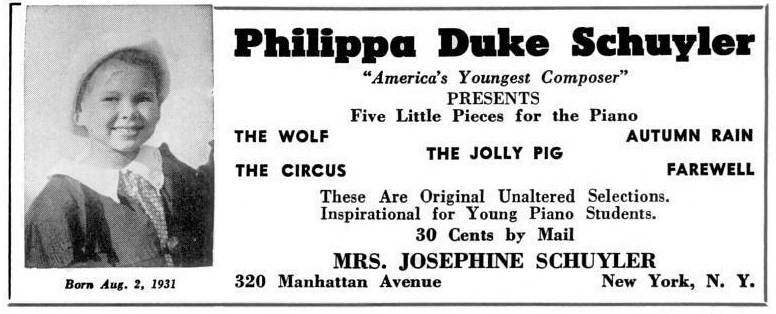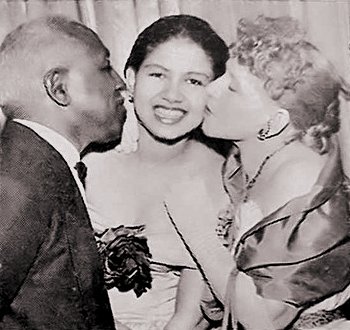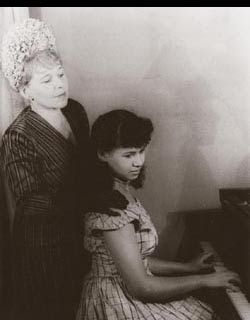

Welcome to Tuesday POU! We continue to look at individuals and events in black history that might make for great stories on the big screen (or even the little screen). This entry today was once featured on our Black Classical Pianists week, but her personal story is a sad, tragic tale that would definitely lead to an Oscar-winning performance with the right screenplay and the right actresses for mother and daughter.

Philippa Duke Schuyler (August 2, 1931 – May 9, 1967) was an American child prodigy and pianist who became famous in the 1930s and 1940s as a result of her talent, mixed-race parentage, and the eccentric methods employed by her mother to bring her up.
Philippa’s parents were George S. Schuyler, a prominent black essayist and journalist Josephine Cogdell, a white Texan and one-time Mack Sennett bathing beauty, from a former slave-owning family. Philippa’s parents believed that intermarriage could “invigorate” both races and produce extraordinary offspring. They also advocated that mixed-race marriage could help to solve many of the United States‘s social problems. (Or, more accurately, Josephine Cogdell, the mom, wrote that down in her diary.) Josephine had gone from man to man and wanted to make a statement, put some kind of meaning in her life. She married George Schuyler, scandalized her folks, fed her daughter on raw liver and brains and began keeping scrapbooks on her “hybrid experiment.”

Cogdell further believed that genius could best be developed by a diet consisting exclusively of raw foods. As a result, Philippa grew up in her New York City apartment eating a diet predominantly comprising raw carrots, peas and yams and raw steak. She was given a daily ration of cod liver oil and lemon slices in place of sweets. “When we travel,” Cogdell said, “Philippa and I amaze waiters. You have to argue with most waiters before they will bring you raw meat. I guess it is rather unusual to see a little girl eating a raw steak.”
Maybe the raw liver worked because in no time Philippa was walking, talking, reading, writing. Her IQ tested out at 180, and by age 4 she was playing Mozart. Her dad was already fooling around with the ladies, but her mother had found her life’s work, the creation of a musical genius. Recognized as a prodigy, Schuyler was reportedly able to read and write at the age of two and a half, and composed music from the age of five. At nine, she became the subject of “Evening With A Gifted Child”, a profile written by Joseph Mitchell, correspondent for The New Yorker, who heard several of her early compositions and noted that she addressed both her parents by their first names.
Her mother whipped her regularly. She never had any friends because she hardly ever got to go to school. When she did go, she was years ahead of the other kids, and she was the only person “of color” for miles around. Thanks to her journalist father, she had her picture in the magazines as a talented “Negro” prodigy, but in day-to-day life it was only Philippa and her mother, locked in an isolated, manipulative struggle. Even her piano teachers, who might have offered her various windows onto the world, were dismissed by her mother as soon as there was any emotional attachment between them and Philippa.

Schuyler began giving piano recitals and radio broadcasts while still a child and attracted significant press coverage. New York mayor Fiorello La Guardia was one of her admirers and visited her at her home on more than one occasion. By the time she reached adolescence, Schuyler was touring constantly, both in the US and overseas.
Her talent as a pianist was widely acknowledged, although many critics believed that her forte lay in playing vigorous pieces and criticized her style when tackling more nuanced works. Acclaim for her performances led to her becoming a role model for many children in the United States of the 1930s and 1940s, but Schuyler’s own childhood was blighted when, during her teenage years, her parents showed her the scrapbooks they had compiled recording her life and career.
When Philippa is presented with the scrapbooks that chronicle her life, she’s horrified; she understands that from her parents’ point of view, she’s been a genetic experiment. She can’t even take credit for her own “genius” since her mother has been so relentlessly pulling the strings in her life. But she has no recourse; her whole existence has been playing the piano, dolling up in the spotlight and then either working for, with, or against her mother. There is no way out.

After Philippa is grown, her touring takes her through South America, Europe, Africa. She’s well received, but her life is at once adventurous and intensely narrow. She rarely has the time to have fun or even see where she’s touring. In Africa, she’s tormented by all that it means to be black. Indeed, as time goes by, she decides she really isn’t black. “I am not a Negro!” she writes her mother, and using mental sleight-of-hand, she decides that her father came from Madagascar, and that she’s really “Malay-American-Indian and European.”
So desperate was she not to be “colored” that she took out a passport in another name, Felipa Monterro y Schuyler, suggesting that she had an Iberian heritage. Her politics had by this time become so strange that she lectured regularly to the John Birch Society. Although she engaged in a number of affairs, and on one occasion endured a dangerous late-term abortion after a relationship with a Ghanaian diplomat, she never married. She had strings of suitors who treated her badly, and the one man who loved her she couldn’t abide.
She was, in a phrase, totally screwed up. She was unable to resolve the elements of black and white in her own life, unable to shake off her demon mother, unable to love or be loved. She died in 1967 in a helicopter accident in Vietnam, where she had gone in her new career as a reporter.
Her mother was profoundly affected by her daughter’s death and committed suicide a few days before its second anniversary.
Film rights to Schuyler’s biography have been sold and it was once reported that she was to become the subject of a movie starring Alicia Keys.

